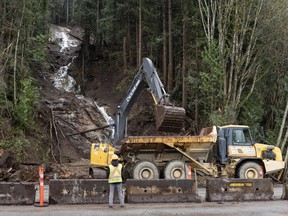One expert said he thought it was unusual for police to investigate the cause of the Lions Bay landslide or debris flow and wondered if it might have something to do with questions about possible human involvement.

The RCMP is investigating the cause of the deadly landslide that killed two people in Lions Bay in mid-December, Postmedia News has learned.
One expert said he thought it was unusual for police to investigate the cause of a landslide or debris flow and wondered if it might have something to do with questions about possible human involvement.
“I don’t know what the background is as to why they’re doing that. You know, clearly there’s a fatality, so that puts it in a different light,” said John Clague, a professor emeritus of earth sciences at Simon Fraser University and a leading authority on natural hazards.
If the RCMP is involved, Clague said it likely has something to do with questions about the possibility of a human fingerprint on the failure, that is some disturbance of the ground at the source or along the debris flow path that may have triggered the failure or altered the flow of the debris.
“Seems unlikely, but their involvement must be grounded in a suspicion that this was not solely Mother Nature’s doing,” said Clague, an editor in chief of the scientific journal Natural Hazards.
The RCMP didn’t respond to Postmedia questions on the details of its investigation and whether the probe was being carried out solely by the nearby Squamish RCMP detachment.
“This investigation is ongoing and any information cannot be disclosed from us as it could compromise the investigation,” RCMP Const. Kelly Wu said in a written statement.
Residents who heard or saw the slide, described a roaring and cracking sound, with mud and trees sliding down the slope.
Metro Vancouver officials have said the landslide originated on Crown land near private property in Electoral Area A of the regional district, which is just outside the boundaries of the Village of Lions Bay. The slide swept down Battani Creek, one of the smaller creeks that flow through Lions Bay. The Enns’ home was near the creek.
There has been some work in the past decade or more to the northeast of Battani Creek to build access roads and trails to private property and to a private water reservoir that included work on Crown land and on land that was within the regional district and the Village of Lions Bay.
Provincial and Metro Vancouver officials said this week they couldn’t comment on anything to do with the cause of the slide because it’s under investigation by the Mounties.
Scott Blackwell, Lions Bay’s chief administrative officer, said Thursday he had no knowledge of what the RCMP investigation entailed.
Blackwell said that he expects the village will eventually get back a summary report from the geotechnical engineers hired to assess damage and risks from the debris flow. But what the report will ultimately say is unknown at this time, said Blackwell.
The evacuation order on two homes on Goldenrod Avenue, near where the Enns’ home was swept away, has been lifted. But evacuation alerts remain in place on those properties and several others while two debris jams are cleared along the landslide’s path, noted Blackwell.
It’s unclear at this time what type of investigation, if any, the province might carry out.
The B.C. Coroners Service said it’s carrying out an investigation into the deaths of the couple.
Coroner spokeswoman Amber Schinkel said that because the investigations are open and active she couldn’t provide any details or say how long they would take to conclude their probe.
The Sea to Sky Highway corridor is an area of known risk for landslides, debris flows and rockfalls. Two people were killed in a slide in Lions Bay in 1983 and another nine people were killed in a nearby slide in 1981 that wiped out a bridge.
Blackwell said small communities like Lions Bay need the help of the province to mitigate the increased natural hazard risks from climate change, including from landslides and debris flows. He said the small communities simply don’t have the capacity to pay for any major mitigation works.
The Union of B.C. Municipalities has also repeatedly asked the provincial government for long-term funding to support better emergency planning and natural risk hazard mitigation, including for flooding and wildfires.
The UBCM has pointed out that the province’s new emergency management legislation will require local governments to take on additional roles and responsibilities in order to strengthen emergency management in B.C.
“Delivering on emergency management obligations has become more complex and costly with the increased intensity and frequency of events taking a significant toll on limited local government human and financial resources,” said UBCM president Trish Mandewo.